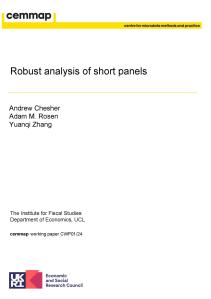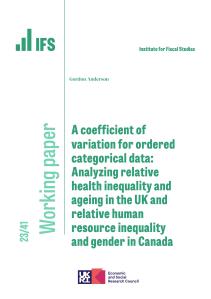Downloads
bootwildct.zip
ZIP | 11.83 KB
This command implements the wild-cluster bootstrap-t procedure, with a specified null hypothesis, as described in Cameron et al (2007). This procedure is shown to improve inference in cases with few clusters.
It is a post-estimation command, which works for linear models with clustered standard errors and with simple hypotheses only. The command should work with versions of stata above 10.1. Note that varlist should include ALL the right hand side variables included in the linear model for which one estimates these t-statistics.
The zip folder contains an ado file and a help file.
Authors

Research Fellow University of Kent
Bansi is a Research Fellow of the IFS, a Senior Lecturer of Economics at the University of Kent and also a Fellow at the Global Labor Organisation.

Molly Scott
Resource details
- Publisher
- IFS
Suggested citation
Malde, B and Scott, M. (2012). bootwildct. London: IFS.
More from IFS
Understand this issue

Gender norms, violence and adolescent girls’ trajectories: Evidence from India
24 October 2022

Empty defence spending promises are a shot in the dark
29 April 2024

Public investment: what you need to know
25 April 2024
Policy analysis

ABC of SV: Limited Information Likelihood Inference in Stochastic Volatility Jump-Diffusion Models
We develop novel methods for estimation and filtering of continuous-time models with stochastic volatility and jumps using so-called Approximate Bayesian Compu- tation which build likelihoods based on limited information.
12 August 2014

Assessing the economic benefits of education: reconciling microeconomic and macroeconomic approaches
This CAYT report discusses the strengths and limitations of several approaches to assessing the effect of education on productivity.
14 March 2013

Misreported schooling, multiple measures and returns to educational qualifications
We provide a number of contributions of policy, practical and methodological interest to the study of the returns to educational qualifications in the presence of misreporting.
1 February 2012
Academic research

Understanding Society: minimising selection biases in data collection using mobile apps
2 February 2024

Robust analysis of short panels
8 January 2024

A coefficient of variation for ordered categorical data: Analyzing relative health inequality and ageing in the UK and relative human resource inequality and gender in Canada
21 December 2023